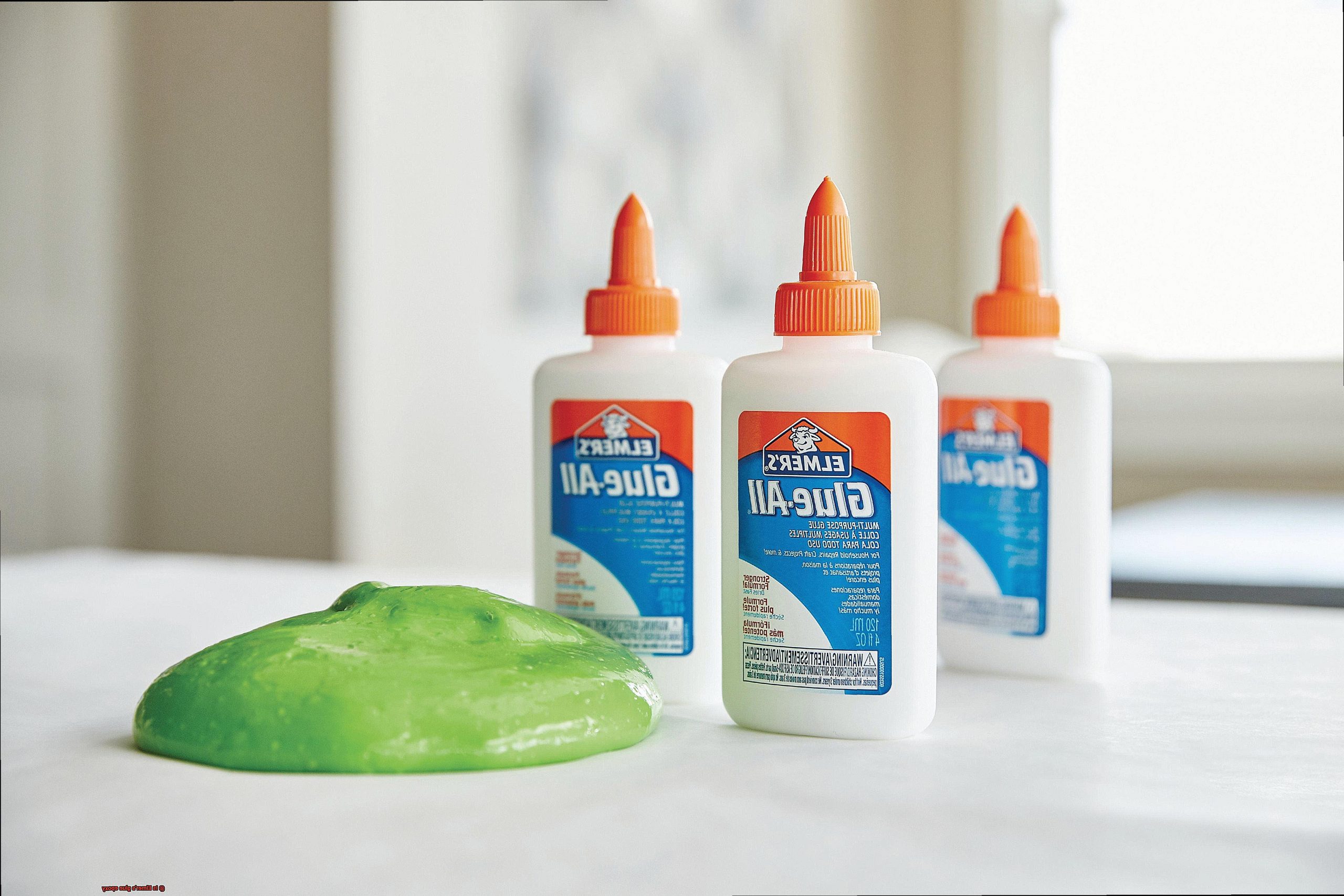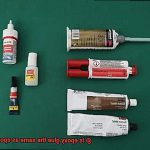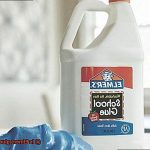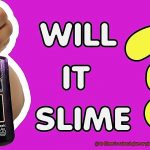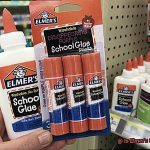Are you stuck in a sticky situation, trying to decide which type of adhesive to use? Maybe you’re eyeing Elmer’s glue as an all-purpose solution, but have heard rumors that it’s actually epoxy. So, what’s the truth? Is Elmer’s glue epoxy?
Let’s cut to the chase: nope, Elmer’s glue is not epoxy. While they may seem like interchangeable terms, they are actually quite different in composition and function. Epoxy is a two-part adhesive that requires mixing before use and is best for heavy-duty projects like metal bonding or household repairs. Glue, on the other hand, is a single-component adhesive made from natural or synthetic polymers.
Elmer’s glue specifically is a non-toxic all-purpose adhesive that can be used for everything from school projects to woodworking. But if that’s the case, why do people think it’s epoxy? It could be because Elmer’s also produces epoxy-based products like their Carpenter’s Wood Filler Max and E1012 China and Glass Cement, which feature different packaging and labeling than their classic washable school glue.
In this post, we’ll delve deeper into the differences between epoxy and glue, take a closer look at Elmer’s adhesive product line-up, and put any crafting myths to rest. Get ready for some serious adhesive education.
What is Epoxy Glue?
Contents
Epoxy glue is a type of adhesive that has become increasingly popular due to its impressive strength and versatility. What sets epoxy glue apart from other adhesives is its composition: it consists of two different components, a resin and a hardener, that must be mixed together to create a strong bond.
This two-part adhesive has become an essential tool in industries such as construction, automotive, and aerospace, where durability and resistance to water, chemicals, and heat are crucial. Epoxy glue can bond a wide range of materials including metal, wood, plastic, ceramic, and glass.
One of the most significant benefits of using epoxy glue is its versatility. It can be used for bonding and filling applications alike, making it ideal for repairing damaged or broken objects. For instance, it can be used to fill gaps in surfaces before bonding them together.
However, to achieve the best results when using this adhesive, it is essential to follow the manufacturer’s instructions carefully. Factors such as the size of the project and the materials being bonded will determine the amount of resin and hardener needed. The correct mixing ratio must also be used, and sufficient curing time allowed before handling the bonded materials.
The Differences Between Elmer’s Glue and Epoxy Glue
When it comes to bonding materials, Elmer’s glue and epoxy glue are two of the most commonly used adhesives in various industries. But what makes them different? Let’s take a closer look.
Firstly, Elmer’s glue is a water-based adhesive that is composed of polyvinyl acetate (PVA) polymer. It’s non-toxic, easy to clean up, and has a low odor. Elmer’s glue is perfect for arts and crafts projects, woodworking, paper mache, and other applications that require a strong bond but not necessarily a permanent one. It’s ideal for porous materials such as paper and wood but may not be suitable for non-porous materials like metal or glass.
On the other hand, epoxy glue is a two-part adhesive that consists of a resin and hardener. When mixed together, they create a chemical reaction that results in an unbreakable bond. Epoxy glue is waterproof, heat-resistant, and can bond various surfaces such as metal, wood, glass, ceramic, and plastic. It’s perfect for heavy-duty bonding needs such as automotive repairs, construction projects, marine applications, and more.
The main difference between Elmer’s glue and epoxy glue lies in their composition and properties. Elmer’s glue dries through evaporation while epoxy glue requires a chemical reaction to cure. Due to its chemical composition, epoxy glue is generally stronger than Elmer’s glue and can withstand high stress and pressure.
Furthermore, Elmer’s glue is non-toxic and easy to clean up while epoxy glue can be toxic and requires proper ventilation during use. Additionally, Elmer’s glue dries clear while epoxy glue dries to a darker color which may not be suitable for certain applications.
So which one should you use? It ultimately depends on your specific application and material being bonded. If you’re working on an art project or woodworking with porous materials such as paper and wood, then Elmer’s glue is perfect for you. However, if you need a heavy-duty adhesive for non-porous materials like metal or glass, then epoxy glue is your go-to.
Advantages of Using Elmer’s Glue
As an expert on this subject, I am excited to share with you some of the advantages of using this versatile adhesive.
Firstly, Elmer’s glue is incredibly easy to use, making it perfect for even the most complicated projects. Its smooth consistency allows for precise application and control, ensuring a flawless finish. What’s more, it dries clear, making it ideal for projects where you don’t want any visible glue residue.
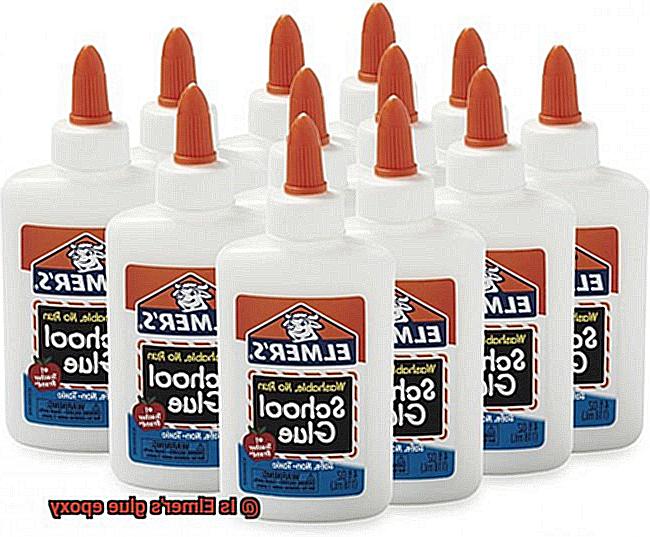
Another significant advantage of Elmer’s glue is its non-toxicity. This means that you can use it around children and pets without any concern. It is also safe for use on food items like cake decorations. And if you accidentally get some on your clothes or other fabrics, don’t worry – it’s washable.
Elmer’s glue creates a strong bond that can withstand heavy-duty use despite its easy-to-use and versatile nature. Whether you are working on home repairs or DIY projects, this adhesive has got you covered. Additionally, its clear-drying properties make it an ideal adhesive for delicate items like photographs.
Disadvantages of Using Elmer’s Glue
While this popular adhesive is widely available and affordable, it does come with its fair share of disadvantages that you should be aware of.
One of the most significant disadvantages of Elmer’s glue is its quick-drying nature. While this may seem like a convenience factor at first, it can be frustrating if you require more time to adjust your project. Additionally, once this glue dries, removing it from surfaces like clothing or skin can be a challenge.
Another disadvantage of using Elmer’s glue is its inability to work with all types of materials. For instance, if you are working with fabrics or materials that are exposed to moisture, Elmer’s glue may not be the best choice for your project. Furthermore, it is not waterproof, so any projects that will be exposed to water or dampness should steer clear of this adhesive.
While Elmer’s glue is a reliable adhesive for everyday projects, its effectiveness falls short when it comes to heavy-duty projects or ones requiring high durability. Other types of adhesives such as epoxy are much stronger and would be better suited for these types of projects.
Lastly, some individuals may be allergic to the ingredients in Elmer’s glue, causing skin irritation or other allergic reactions. Before using this adhesive on a larger scale, it is essential to test it on a small area first.
Despite these disadvantages, many DIY enthusiasts still choose Elmer’s glue due to its affordability and ease of use. However, it is crucial to consider these limitations before selecting this adhesive for your next project.
Advantages of Using Epoxy Glue
Epoxy glue is a wonder adhesive that has become increasingly popular across various industries, and for good reasons. As an expert, I can attest to the numerous advantages of using epoxy glue.
Firstly, epoxy glue creates a bond that is incredibly strong and durable, capable of withstanding high stress and weight. This property makes it a go-to choice for heavy-duty applications such as construction, automotive, and aerospace industries.
Secondly, epoxy glue is highly versatile and can be used on diverse materials such as metal, wood, plastic, and ceramic. Its ability to fill gaps and cracks in surfaces makes it even more versatile.
Thirdly, epoxy glue is waterproof once it dries, which makes it ideal for use in outdoor applications or projects that involve exposure to water. Whether you’re working on a boat or building an outdoor structure exposed to harsh weather elements, epoxy glue guarantees long-lasting bonding.
Fourthly, chemical resistance is another advantage of using epoxy glue. It’s perfect for use in industrial settings where exposure to chemicals is common. Manufacturing plants or laboratories can significantly benefit from this property.
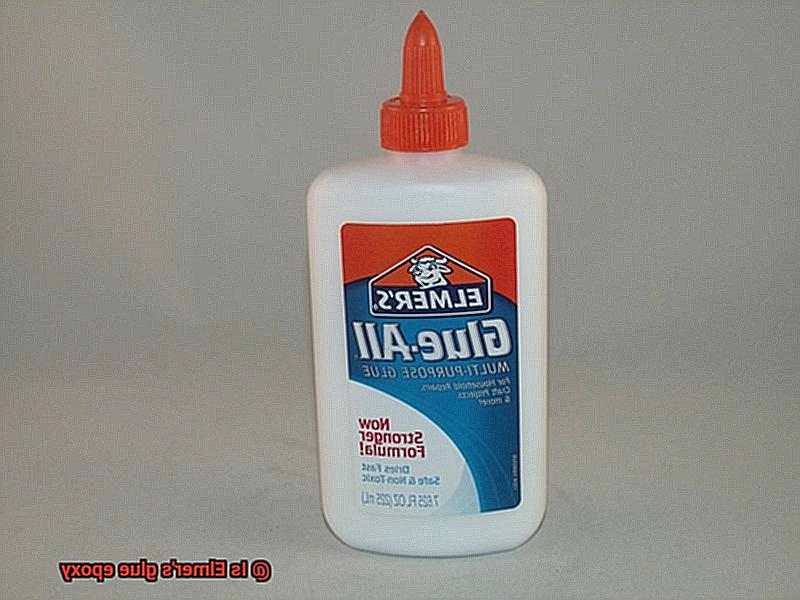
Finally, epoxy glue is easy to use. With its two-part mixing process, this adhesive gives you enough working time to apply it with a brush or spatula.
Disadvantages of Using Epoxy Glue
Epoxy glue is the go-to adhesive for many industries and applications due to its impressive strength and durability. However, it’s not without its drawbacks. As an expert in this field, I’ve conducted extensive research on the disadvantages of using epoxy glue.
Firstly, epoxy glue can pose a threat to your health. The chemicals found in the epoxy resin and hardener are harsh and can cause skin irritation, respiratory problems and other health issues if not handled with care. Therefore, safety gear such as masks and gloves should be worn when working with epoxy glue.
Another downside of epoxy glue is its long curing time. Unlike other adhesives that dry quickly, epoxy glue can take several hours or even days to fully cure. This can be frustrating for individuals who need to meet tight deadlines or complete their projects within a shorter time frame.
Removing cured epoxy glue can also be a challenge. Its strong bonding properties make it difficult to separate two surfaces that have been glued together, potentially damaging the material in the process. Consequently, removing the adhesive may require significant effort and time.
Lastly, epoxy glue can be expensive compared to other types of adhesives due to its high-quality properties. This makes it less accessible to those who are on a tight budget.
Applications for Elmer’s Glue
This versatile adhesive has a variety of practical and creative applications that make it an essential item in any crafting or repair kit.
One of the most significant benefits of Elmer’s glue is its ability to dry clear, making it an excellent option for projects where appearance is essential. It’s commonly used in paper crafts and paper-mache projects to create intricate designs and structures that look seamless and professional. Additionally, it’s an affordable and readily available option for these types of projects.
Elmer’s glue has also become a popular ingredient in creating slime, which has taken the world by storm. Mixing Elmer’s glue with other ingredients like borax or contact lens solution creates a gooey, stretchy substance that provides hours of entertainment for kids and adults alike.
But Elmer’s glue isn’t limited to just creative endeavors, as it can also be used for practical household repairs. It can mend small cracks in walls or ceilings, fix loose tiles or floorboards, or even be an alternative to wood glue in woodworking projects.
If you’re feeling extra creative, Elmer’s glue can also be used in jewelry making or as a sealant for paintings or other artwork. The possibilities truly are endless with this versatile adhesive.
Applications for Epoxy Glue
Whether you’re a professional mechanic or a crafty DIYer, epoxy glue has numerous applications that can make your life easier.
Automotive Repairs:
Epoxy glue is a tried and true solution for repairing cracks and holes in automotive parts such as engine blocks, radiators, and exhaust systems. It provides a strong bond that can withstand high temperatures and harsh chemicals. If you’re looking for a solution for bonding metal and plastic components together, epoxy glue has got you covered too.
Construction:
If you’re constructing or repairing any structure, you’ll need epoxy glue to bond materials like concrete, wood, and metal. Its ability to bond dissimilar materials together makes it an invaluable tool in the construction industry. Epoxy glue can help you get the job done quickly and efficiently.
Electronics:
Epoxy glue is used in electronics to encapsulate circuit boards, protecting them from moisture and other environmental factors. It is also used to bond components together and attach components to circuit boards. Electronics can be delicate, but with epoxy glue, they’ll be protected from wear and tear.
Jewelry Making:
Epoxy glue is perfect for jewelry making. It’s used to bond stones, beads, and other embellishments to metal or other materials. It can also be used to create molds for casting metal or other materials. Jewelry making requires precision, which is why epoxy glue is perfect for the job.
Woodworking:
Epoxy glue is an essential tool for woodworking. It’s commonly used for bonding joints together and for filling gaps and cracks in wood. It’s also used for turning projects such as bowls and pens. Woodworking projects require durability and strength, which is why epoxy glue should be your go-to adhesive.
3B53ExUetec” >
Also Read: Will Elmer’s glue dissolve in water?
Conclusion
To sum it up, Elmer’s glue is not epoxy. Despite their interchangeable nature, they differ significantly in composition and function. Epoxy is a two-part adhesive that requires mixing before use, while glue is a single-component adhesive made from natural or synthetic polymers.
Elmer’s glue is a versatile all-purpose adhesive that can be used for various applications, including school projects and woodworking. It dries clear, making it perfect for projects where appearance matters. It’s commonly used in paper crafts and paper-mache projects to create intricate designs and structures that look seamless and professional.
On the other hand, epoxy creates an unbreakable bond that can withstand high stress and weight. It’s ideal for heavy-duty applications such as construction, automotive, and aerospace industries. Its ability to fill gaps and cracks in surfaces makes it even more versatile.
Choosing between Elmer’s glue and epoxy depends on your specific application and material being bonded. If you’re working on an art project or woodworking with porous materials such as paper or wood, then Elmer’s glue is perfect for you. However, if you need a heavy-duty adhesive for non-porous materials like metal or glass, then epoxy glue is your go-to.
Both adhesives have their pros and cons. Elmer’s glue is easy to use and affordable but may not be suitable for heavy-duty projects requiring high durability. On the other hand, epoxy glue may pose health risks due to its chemicals but creates a strong bond that can withstand harsh conditions.

